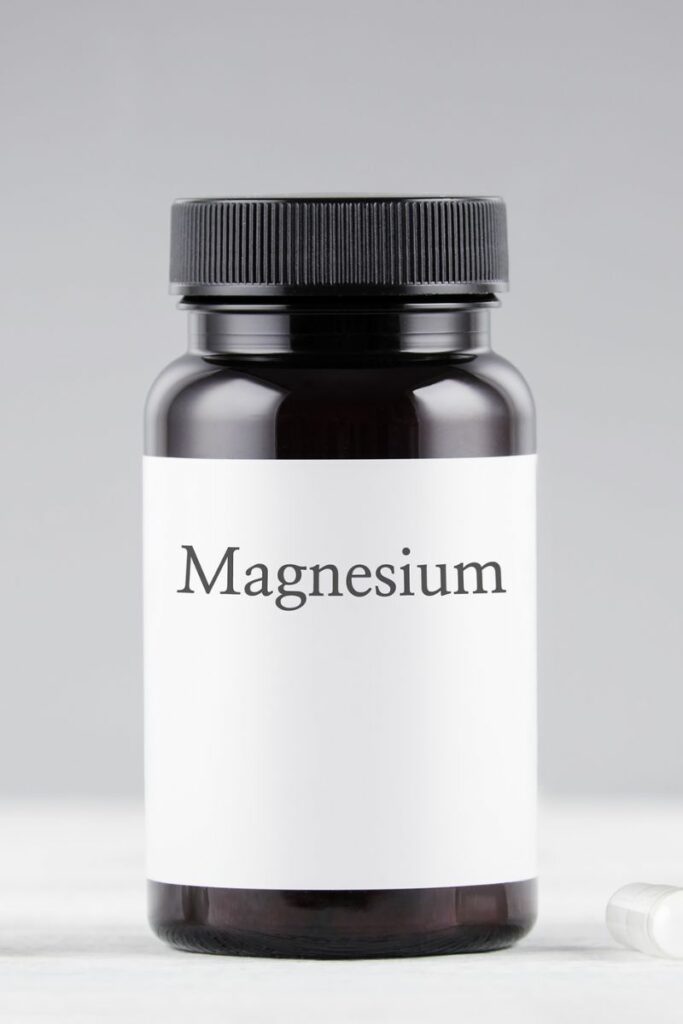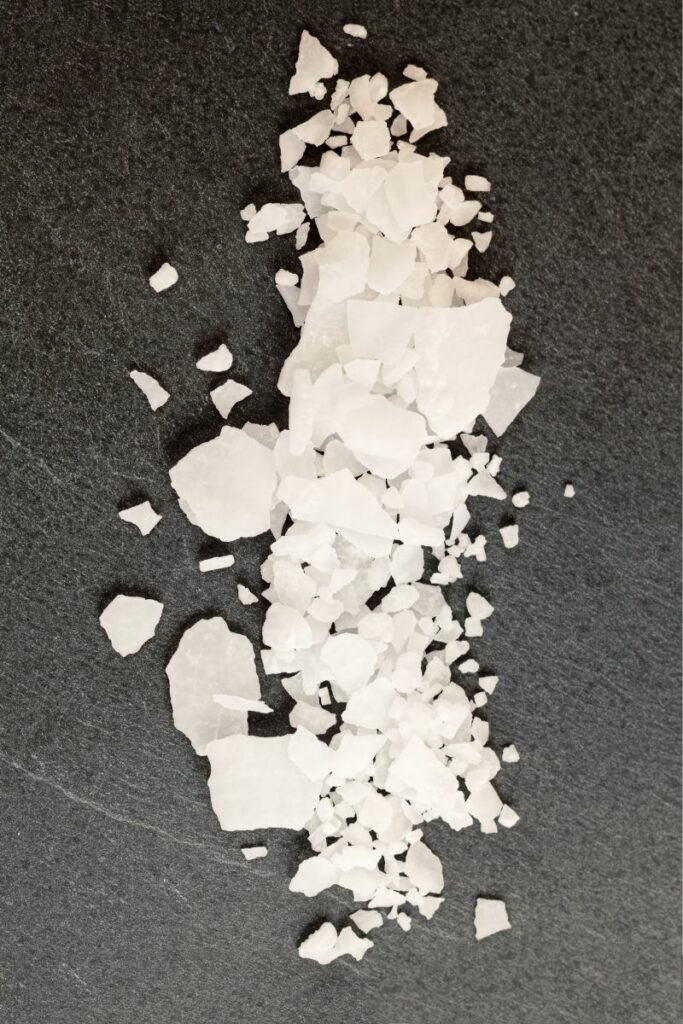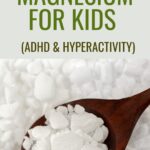Guide To The Best Magnesium for ADHD And Hyperactivity
Let's explore how magnesium can be a part of your strategy to manage ADHD and hyperactivity, which is the best magnesium for adhd, and how to incorporate it safely into your or your child’s routine. Whether you're cautiously optimistic or curiously skeptical, let's delve into the world of magnesium and discover its potential together.

This is not medical advice. Information and statements shown here are for educational and informational purposes only and are not to replace the advice of your healthcare professional.
This post may include affiliate links. Please refer to our disclaimer for full disclosure.
Imagine this: your 10-year-old has been diagnosed with ADHD, and every day is a roller coaster of highs and lows, with attention flitting from one activity to another like a butterfly. You've tried various strategies, but the thought of relying solely on medication leaves you uneasy. You wonder, "Is there a natural way to help manage these symptoms?" This question leads you down a path of research and discovery, where you stumble upon a glimmer of hope: magnesium.
Magnesium, a mineral praised for its calming properties and essential role in over 300 biochemical reactions in the body, has shown potential in managing ADHD symptoms. Researchers suggest that magnesium might help soothe the nervous system and improve neurological functions, which can be particularly beneficial for those dealing with hyperactivity and difficulty focusing. The link between adequate magnesium levels and improved attention span, better sleep, and reduced irritability could be a game-changer for managing ADHD naturally.
Why Magnesium Matters
Magnesium is not just another dietary supplement you see on the shelf; it's a pivotal mineral and essential nutrient that plays a crucial role in maintaining overall health. It's involved in over 300 enzymatic reactions in the body, helping to regulate muscle and nerve function, blood sugar levels, and blood pressure, as well as making protein, bone, and DNA. But it doesn’t stop there—magnesium is also profoundly important for maintaining a healthy brain and nervous system.

Magnesium's Role in Brain Health
In the brain, magnesium acts almost like a gatekeeper for NMDA receptors, which are involved in the development of the brain and its plasticity. This is crucial because well-regulated NMDA receptors are essential for healthy brain activity, aiding in learning and memory functions. Magnesium helps to protect these receptors from being overstimulated by calcium, which can be toxic to nerve cells—a mechanism that is particularly important in reducing the risk of neuronal damage and the long-term impacts associated with it.
Furthermore, magnesium has a calming effect on the nervous system. It helps control the body’s stress-response system and is often referred to as nature's 'original chill pill.' For individuals with ADHD, who may have an overactive nervous system, magnesium can help manage stress and reduce symptoms like irritability and restlessness. This calming effect also extends to improving sleep quality, which is often a challenge for those with hyperactivity disorders.
Behavior Management and Magnesium
Behavioral issues associated with ADHD, such as impulsivity, short attention spans, and hyperactivity, may also be mitigated through adequate magnesium intake. By helping to stabilize the nervous system, magnesium can contribute to better behavioral management, allowing for longer periods of focus and reduced hyperactive episodes. It's believed that magnesium's ability to improve the function of neurotransmitters is key here, providing a smoother, more balanced neural communication.
The benefits of magnesium in managing ADHD symptoms are supported by various studies. For instance, research has shown that children with ADHD often have lower levels of magnesium compared to their peers, and supplementation can lead to noticeable improvements in hyperactivity.
Through its roles in brain health and behavior management, magnesium proves to be a vital nutrient, especially for those dealing with ADHD. It offers a natural approach to enhancing cognitive function and managing symptoms, making it a cornerstone in the quest for better mental health and well-being.

Magnesium vs. ADHD Medications
When exploring treatments for ADHD, it's common to compare the effects of dietary supplements like magnesium with traditional ADHD medications. Both approaches aim to manage symptoms, but they work in different ways and offer distinct benefits and considerations. Understanding these differences can help individuals and caregivers make informed decisions about managing ADHD symptoms.
Mechanism of Action
- Magnesium: Magnesium plays a critical role in nerve function and brain health. It helps stabilize nerve cells, prevents overstimulation of the brain, aids in neurotransmitter function, and has a calming effect on the nervous system. These properties can help alleviate symptoms of ADHD such as restlessness, irritability, and difficulties with concentration.
- ADHD Medications: These typically include stimulants like methylphenidate and amphetamines, as well as non-stimulant options like atomoxetine. Stimulants increase dopamine and norepinephrine levels in the brain, which helps improve concentration and reduce impulsivity and hyperactivity. Non-stimulants work on neurotransmitters as well, but they do not increase dopamine.
Benefits
- Magnesium:
- Side Effects: Generally has fewer and milder side effects compared to medications. Common side effects are digestive in nature and can be mitigated by adjusting the dosage or form of magnesium.
- Holistic Health: Magnesium also offers general health benefits, such as improving sleep quality, muscle function, and overall stress reduction.
- ADHD Medications:
- Efficacy: Typically offer more immediate and noticeable improvements in concentration, hyperactivity, and impulsivity.
- Precision: Dosages can be finely tuned to achieve the best possible control over symptoms.
Considerations
- Magnesium:
- Subtler Effects: The effects of magnesium on ADHD symptoms are generally subtler and might take longer to become noticeable.
- Dietary Sources: Can be consumed through diet and supplementation, offering a more natural approach to symptom management.
- ADHD Medications:
- Side Effects: Can include appetite suppression, sleep disturbances, and potential cardiovascular effects, which need careful management and monitoring.
- Dependency: Some stimulant medications have a potential for dependency or abuse, which requires careful prescription and monitoring.
It’s not uncommon for healthcare providers to recommend a combination of treatments, including both magnesium supplements and ADHD medications. This approach allows the benefits of both: immediate improvement from the medication and long-term health benefits from magnesium. It’s important, however, to always consult with a healthcare provider to ensure that any combination of treatments is safe and appropriate.
Magnesium and ADHD: What the Research Says
Research on the link between magnesium and ADHD has grown, highlighting a potentially significant connection. Studies have specifically investigated how varying magnesium levels in the body could correlate with ADHD symptoms, offering valuable insights for those seeking natural therapeutic options.
Understanding the Research
One pivotal study found a marked deficiency in magnesium levels among children diagnosed with ADHD compared to their non-ADHD peers. This research indicated that lower magnesium levels might be linked to more severe symptoms of ADHD, such as increased hyperactivity and impulsiveness (Kozielec & Starobrat-Hermelin, 1997). The study suggested that magnesium supplementation might help alleviate these symptoms, proposing a potential link between magnesium deficiency and the severity of the disorder.
Further investigation into magnesium's effects on ADHD was conducted through a controlled trial where children with ADHD received magnesium supplements over several months. The outcomes, published in the "Journal of Pediatrics," demonstrated significant improvement in behaviors that are typically challenging for those with ADHD, such as maintaining attention and controlling impulses (Mousain-Bosc et al., 2006). These findings not only reinforce the potential role of magnesium in managing ADHD but also highlight its utility as a supportive treatment in reducing symptom severity.
How Magnesium Supplementation Can Help
The research collectively suggests that magnesium supplementation could enhance neurological functions that are compromised in individuals with ADHD. By calming the nervous system, magnesium can be particularly beneficial for reducing hyperactivity and impulsivity. It also plays a role in improving sleep patterns, which in turn can enhance overall cognitive function and behavior during waking hours.
Additionally, magnesium's influence on neurotransmitter regulation is crucial. It helps increase the production of serotonin, known for its role in boosting mood and reducing stress, which can be particularly beneficial for ADHD children who often experience emotional dysregulation.
Key Takeaways Of The Research
- Deficiency Link: Lower magnesium levels in individuals with ADHD are associated with more severe symptoms, suggesting that addressing this deficiency might mitigate these challenges (Kozielec & Starobrat-Hermelin, 1997).
- Behavioral Improvements: Supplementing with magnesium has been shown to improve key ADHD symptoms, including attention span, hyperactivity, and impulsivity (Mousain-Bosc et al., 2006).
- Enhanced Neurological Function: Magnesium contributes to healthier brain function by protecting and supporting neural pathways, which may be underactive or overstimulated in ADHD.
These studies underscore magnesium's potential as a beneficial adjunct therapy for ADHD, proposing a natural approach that, when combined with other treatments and lifestyle adjustments, can significantly improve management of the disorder.

Different Types of Magnesium
When considering magnesium supplementation, it's important to understand that not all forms of magnesium are created equal. Each type has different rates of absorption and different uses in the body. Here, we'll explore three common forms of magnesium supplements: magnesium citrate, magnesium oxide, and magnesium glycinate, highlighting their unique benefits and suitability for managing ADHD symptoms.
Magnesium Citrate
Magnesium citrate is one of the most popular and easily absorbed forms of magnesium. It is made by combining magnesium with citric acid, which gives it a mild laxative effect. This form is particularly beneficial for individuals who are also dealing with constipation, a common issue in some people with ADHD due to dietary habits and medication side effects.
Its high bioavailability means that magnesium citrate is effective in replenishing magnesium quickly, which can help in managing irritability and concentration difficulties associated with ADHD.
Magnesium Oxide
Magnesium oxide is another form of magnesium that is commonly available and used primarily for its digestive benefits. It tends to have a higher magnesium content by weight but is less bioavailable than magnesium citrate or glycinate.
This means that while it’s excellent for addressing issues like heartburn and indigestion, it might not be the best option for directly managing ADHD symptoms due to its lower absorption rate. However, it can still contribute to overall magnesium levels in the body.
Magnesium Glycinate
Magnesium glycinate is frequently recommended for those needing to address neurological issues and chronic stress. It combines magnesium with glycine, a calming amino acid that itself acts as a neurotransmitter.
This form is particularly well-suited for individuals with ADHD because it is highly bioavailable, less likely to cause laxative effects, and has a calming effect on the brain. Magnesium glycinate is often used to improve sleep quality, reduce anxiety, and enhance overall mood stability, which can be particularly beneficial for managing hyperactivity and impulsivity.
The Best Magnesium for ADHD And Hyperactivity
For managing ADHD symptoms, magnesium glycinate is generally considered the best choice due to its effective absorption and its gentle effect on the body. Its ability to improve sleep and reduce anxiety can be particularly beneficial in ADHD management, where sleep disturbances and anxiety can exacerbate symptoms. Additionally, its positive influence on neurotransmitter function makes it a suitable option for improving attention and cognitive function.
In summary, while all forms of magnesium can contribute to overall magnesium status and offer specific benefits, magnesium glycinate stands out as the most appropriate for addressing the complex symptoms of ADHD. It provides the calming and neurological benefits needed without unwanted digestive effects, making it an optimal choice for those looking to manage ADHD symptoms effectively.
Topical magnesium chloride spray can also be beneficial.
Choosing the Right Magnesium Supplement
- Quality is key when selecting a supplement. Here are a few pointers:
- Avoid Unnecessary Fillers and Additives: Look for supplements with minimal fillers, artificial flavors, or preservatives. These can affect how well the magnesium is absorbed or might cause adverse reactions.
- Allergen-Free Options: If you have allergies or sensitivities, check for labels that indicate the product is free from common allergens like soy, gluten, dairy, and nuts.
- Third-Party Testing: Choose products that have been independently tested for purity and potency. Certifications or verifications from organizations like USP (United States Pharmacopeia) or NSF International indicate a higher level of trust and assurance.
How Much Magnesium Do You Need for ADHD?
Determining the right amount of magnesium for ADHD can vary based on age, overall health, and specific symptoms. Here are some general dosage guidelines for different age groups, along with advice on adjusting dosages to suit individual needs and make sure you're getting enough magnesium.
General Dosage Guidelines by Age
- Children 4-8 years: For children in this age group, the recommended dietary allowance (RDA) for magnesium is about 130 mg per day. When supplementing specifically for ADHD, dosages might range from 100 to 200 mg per day, depending on individual needs and tolerance.
- Children 9-13 years: The RDA for this age group is 240 mg per day. For ADHD management, supplementation might begin at around 200 mg per day and can be adjusted up to 240 mg if needed and well-tolerated.
- Teenagers 14-18 years: Teenagers require more magnesium, with an RDA of 410 mg per day for males and 360 mg for females. Starting with a supplement dose of about 200 mg daily and increasing up to 300-360 mg of magnesium can be beneficial for ADHD.
- Adults: The general RDA for adults is 400 mg per day for men and 310-320 mg for women. For ADHD, starting at 200-300 mg per day with potential adjustments up to 350-400 mg daily can be effective.
Starting with Lower Doses
When beginning magnesium supplementation for ADHD, it's crucial to start with lower doses. This approach helps to minimize potential side effects, such as diarrhea, which is a common reaction when the body receives more magnesium than it can absorb at one time. Starting low and going slow allows you to monitor the effects of the supplement and adjust the dosage incrementally based on the response and symptom improvement.
Adjusting Dosage Over Time
Adjusting the dosage is key to finding the most effective amount that improves ADHD symptoms without causing adverse effects. Here’s how to approach it:
- Monitor Symptoms: Keep a daily log of ADHD symptoms and note any changes as you adjust the magnesium dosage. This record can help determine if the supplement is effective or if the dosage needs to be adjusted.
- Consult with a Healthcare Provider: It’s essential to work with a healthcare provider, especially when adjusting dosages for children or teenagers. A healthcare provider can offer guidance based on health history and current medications.
- Pay Attention to Dietary Intake: Since magnesium is also available through diet, consider the magnesium intake from food sources. Foods rich in magnesium include nuts, seeds, whole grains, beans, leafy greens, and fish. This natural intake should be factored into the total daily magnesium to prevent excessive consumption.
Regular Re-evaluation
Re-evaluate magnesium needs periodically, as dietary habits, health status, and body demands may change over time, especially during growth spurts in children or due to lifestyle changes in adults.
By adhering to these guidelines, adjusting as necessary, and maintaining regular consultations with healthcare professionals, you can effectively use magnesium to manage ADHD symptoms and support overall brain health.

Combining Magnesium with Other Natural Strategies
While magnesium supplementation can play a significant role in managing ADHD symptoms, combining it with other natural remedies and lifestyle adjustments can enhance its effectiveness. Here’s how you can integrate magnesium with a holistic approach to further support focus, calm, and overall brain health.
Incorporating a Balanced Diet
A well-rounded diet rich in nutrients is fundamental for anyone managing ADHD. Magnesium-rich foods should be a staple. These include:
- Leafy greens such as spinach and Swiss chard.
- Nuts and seeds, particularly pumpkin seeds and almonds.
- Whole grains like brown rice and quinoa.
- Legumes and beans.
- Bananas, which are not only rich in magnesium but also potassium, contributing to nerve function.
A diet that stabilizes blood sugar and provides sustained energy throughout the day can also help manage ADHD symptoms. Opt for complex carbohydrates, lean proteins, and healthy fats to achieve a balanced diet.

Synergy with Omega-3 Fatty Acids
Omega-3 fatty acids are known for their brain health benefits, particularly EPA and DHA, which are crucial for neurological development and function. Studies have shown that omega-3s can help improve attention and reduce hyperactivity and impulsiveness in children and adults with ADHD.
Combining omega-3 supplements with magnesium can be particularly synergistic. Magnesium helps maintain proper nerve function and relaxes the nervous system, while omega-3 fatty acids contribute to the fluidity of cell membranes and promote healthy neurotransmitter function. Together, they can enhance brain health and improve cognitive functions associated with ADHD.
Exercise and Physical Activity
Regular physical activity is another excellent complement to magnesium supplementation for managing ADHD. Exercise releases endorphins, improves mood, and reduces anxiety and depression. It also helps to stimulate the brain in ways similar to ADHD medication but naturally.
Encouraging regular play, structured sports, or even simple activities like walking or cycling can help improve focus and decrease symptoms of ADHD. Exercise can also help in the absorption of magnesium and other nutrients due to improved overall circulation and health.
Mindfulness and Relaxation Techniques
Mindfulness practices and relaxation techniques such as meditation, yoga, or tai chi can further enhance the benefits of magnesium. These practices reduce stress, improve emotional regulation, and increase attention span. Magnesium’s role in relaxing the nervous system complements these techniques by reducing physiological stress responses and enhancing the body’s ability to engage in restful practices.
Sleep
Good sleep is essential for managing ADHD, and magnesium’s natural calming effect can promote better sleep quality. Establishing a regular sleep routine, minimizing screen time before bed, and creating a calming bedtime environment can help maximize the benefits of magnesium supplementation in improving sleep.
Consistency and Routine
Developing a structured routine can help manage ADHD symptoms effectively. This includes consistent meal times, regular exercise, and a stable sleep schedule. Integrating magnesium supplementation into this routine can help ensure consistent levels of this important nutrient throughout the day.
By combining magnesium supplementation with these dietary, lifestyle, and behavioral strategies, you can create a comprehensive plan that addresses the multifaceted nature of ADHD. This holistic approach not only maximizes the potential benefits of magnesium but also supports overall well-being and health management.
While magnesium supplementation is generally considered safe for most people, it is important to be aware of potential side effects and interactions, especially when taken in high doses or without proper medical guidance. Here’s a breakdown of the possible side effects and interactions associated with magnesium supplements.
Possible Side Effects Of Magnesium
Common Side Effects
The most common side effect of magnesium supplementation is gastrointestinal discomfort, which can include:
- Diarrhea: Magnesium, particularly in forms like magnesium citrate or oxide, can have a laxative effect. This is due to magnesium’s ability to draw water into the intestines, which can increase stool frequency and looseness.
- Stomach Cramps and Nausea: High doses of magnesium can irritate the stomach lining, leading to cramps and nausea.
Starting with a lower dose and gradually increasing it, as well as choosing forms of magnesium that are gentler on the stomach like magnesium glycinate, can help minimize these side effects.
Rare Side Effects
Although less common, some people might experience more severe effects such as:
- Hypotension (low blood pressure): Excessive magnesium can lower blood pressure, which might cause symptoms like lightheadedness or fainting.
- Heart Rate Changes: High doses of magnesium can affect electrical conduction in the heart, potentially leading to changes in heart rate.
- Respiratory Issues: In extreme cases, very high levels of magnesium can affect normal respiratory function.
Interactions with Medications
Magnesium can also interact with various medications, affecting their absorption or efficacy. It is crucial to discuss magnesium supplementation with a healthcare provider if you are taking:
- Antibiotics: Magnesium can bind with certain antibiotics, such as tetracycline and quinolone, reducing their effectiveness. It is usually recommended to take magnesium supplements at least two hours before or four to six hours after these antibiotics.
- Diuretics: Depending on the type of diuretic, magnesium levels can either increase or decrease. Loop and thiazide diuretics can increase the excretion of magnesium, potentially leading to deficiency.
- Medications for Osteoporosis: Bisphosphonates used for osteoporosis treatment can be less effective if taken too close to magnesium supplements.
- Medications for Acid Reflux and Stomach Ulcers: Magnesium can affect the absorption of proton pump inhibitors and should be taken at different times to avoid interactions.
Risk of Overdose
Although rare, it is possible to overdose on magnesium supplements, especially if you have kidney issues. The kidneys typically remove excess magnesium efficiently, but if their function is compromised, magnesium can accumulate in the body, leading to toxicity.
Consultation and Monitoring
It’s always best to consult with a healthcare provider before starting any new supplement regimen, especially if you have pre-existing conditions or are taking other medications. Regular monitoring and adjusting dosage based on medical advice and body response are critical to safely using magnesium supplements.
Being aware of these potential side effects and interactions helps ensure that magnesium supplementation is done safely and effectively, maximizing the benefits while minimizing risks.

FAQ Section
To help address some of the common questions surrounding magnesium supplementation for ADHD, here's a list of frequently asked questions that can provide additional insights and clarify some important points for readers.
Can magnesium cure ADHD?
No, magnesium is not a cure for ADHD but can be an effective supplement that helps manage symptoms. It works best when used as part of a broader treatment plan that includes dietary adjustments, behavioral therapy, and, in some cases, medications.
How long does it take for magnesium to affect ADHD symptoms?
The effects of magnesium supplementation can vary. Some individuals might notice improvements in symptoms such as irritability and difficulty sleeping within a few weeks, while changes in attention and hyperactivity may take longer to observe. Consistent intake over several months is often recommended to evaluate its benefits fully.
Are there any specific foods that are particularly high in magnesium?
Yes, some excellent dietary sources of magnesium include leafy green vegetables (like spinach and Swiss chard), nuts and seeds (especially pumpkin seeds and almonds), whole grains (such as brown rice and quinoa), and legumes. Including these foods in your diet can help boost your magnesium intake naturally.
What is the best time of day to take magnesium supplements?
Magnesium can be taken at any time of day, but some people prefer to take it in the evening as its muscle-relaxing effects can help improve sleep quality.
Can children with ADHD safely take magnesium supplements?
Yes, children with ADHD can safely take magnesium supplements, but it is crucial to consult with a pediatrician to determine the appropriate dosage based on the child's age and specific health needs. Starting with a lower dose and adjusting based on response and tolerability is advisable.
Are there any individuals who should avoid magnesium supplements?
Individuals with severe kidney disease or those who are on certain medications that interact with magnesium (like some types of antibiotics and diuretics) should consult their healthcare provider before starting supplementation. Your doctor can provide guidance on whether magnesium supplements are safe for you.
How can I tell if I'm getting too much magnesium?
Symptoms of excess magnesium can include diarrhea, nausea, and abdominal cramping. In more severe cases, it might lead to low blood pressure, confusion, slowed heart rate, and respiratory distress. If you experience any of these symptoms, it's important to consult a healthcare provider.
Conclusion
Magnesium has shown considerable promise in managing symptoms associated with ADHD, offering a natural and beneficial approach to enhancing neurological health. This essential mineral helps in stabilizing mood, improving focus, and reducing hyperactivity by supporting neurotransmitter function and calming the nervous system. Its benefits extend to improving sleep quality and overall emotional regulation, making it a valuable component of ADHD management.
Potential Benefits of Magnesium for ADHD
- Enhanced Focus and Concentration: Magnesium can help improve attention span and cognitive function, which are often challenges for those with ADHD.
- Reduction in Hyperactivity: Its calming effects on the nervous system can help decrease hyperactivity and restlessness.
- Mood Stabilization: Magnesium aids in regulating neurotransmitters, which can improve mood and reduce irritability.
- Improved Sleep: By promoting relaxation, magnesium can contribute to better sleep patterns, which is crucial for overall brain function and managing ADHD symptoms.
Magnesium offers a promising, natural complement to traditional ADHD treatments. By understanding its benefits and integrating it carefully into daily routines, individuals with ADHD can potentially see significant improvements in their symptoms and overall quality of life.
Sources:
- Kozielec, T., & Starobrat-Hermelin, B. (1997). Assessment of magnesium levels in children with attention deficit hyperactivity disorder (ADHD). Magnesium Research, 10(2), 143-148.
- Mousain-Bosc, M., Roche, M., Polge, A., Pradal-Prat, D., Rapin, J., & Bali, J.P. (2006). Improvement of neurobehavioral disorders in children supplemented with magnesium-vitamin B6. II. Pervasive developmental disorder-autism. Journal of the American College of Nutrition, 25(1), 16-23.



